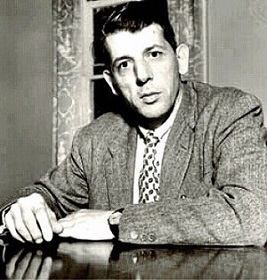De Amerikaanse dichter, vertaler en etymoloog John Anthony Ciardi werd geboren op 24 juni 1916 in Boston. Na de dood van zijn vader in 1919, werd hij opgevoed door zijn Italiaanse moeder (die analfabeet was) en zijn drie oudere zussen, die allemaal zo zuinig leefden en spaarden tot ze genoeg geld had om hem te laten studeren. Ciardi begon zijn hogere studies aan het Bates College in Lewiston, Maine, maar stapte over naar de Tufts University in Boston, waar hij studeerde onder de dichter John Holmes. Hij behaalde zijn diploma in 1938, en won een studiebeurs voor de universiteit van Michigan , waar hij zijn master’s degree behaalde ende eerste van vele prijzen voor zijn poëzie won. Ciardi leerde kort aan de universiteit van Kansas City voordat hij in 1942 bij de Amerikaanse luchtmacht ging. Hij vloog als boordschutter zo’n twintig missies boven Japan. Hij werd ontslagen in oktober 1945 met de rang van sergeant en met verschillende onderscheidingen. Ciardi’s dagboek , Saipan, werd postuum gepubliceerd in 1988. Na de oorlog keerde Ciardi terug naar de UKC. Van 1946 tot 1953 was hij assistent-hoogleraar aan Harvard University. In zijn tijd aan Harvard begon Ciardi zijn lange samenwerking met de Bread Loaf Writers Conference aan het Middlebury College in Vermont, waar hij bijna 30 jaar lezingen over poëzie gaf.
Ciardi had zijn eerste dichtbundel “Homeward to America” in 1940, voor de oorlog, gepubliceerd. Zijn volgende bundel “Other Skies” werd gepubliceerd in 1947. Zijn derde boek “Live Another Day” kwam uit in 1949. Ciardi was begonnen om voor zijn lessen aan Harvard Dantes Goddelijke Komedie te vertalen en ging daarmee verder gedurende heel zijn tijd daar. Zijn vertaling van “Inferno” werd gepubliceerd in 1954. De vertaling van “De Louteringsberg” volgde in 1961 en die van “Paradiso” in 1970. Van 1953 tot 1961 doceerde hij creatief schrijven aan de Rutgers University, waarna hij koos voor een lucratieve carrière in het college tour circuit.
Ciardi schreef ook een reeks boeken over etymologie : “A Browser’s Dictionary” (1980), “A Second Browser’s Dictionary” (1983) en “Good Words to You” (1987). Hij raakte tijdens de tegencultuur van de late jaren 1960 en 1970 wat in de vergetelheid. In 1956 ontving Ciardi de Prix de Rome van de Amerikaanse Academie van Kunsten en Letteren. Hij won ook de American Platform Association’s Carl Sandburg Award in 1980. Als erkenning van het werk van Ciardi wordt jaarlijks de John Ciardi Lifetime Achievement Award voor poëzie toegekend aan een Italiaans- Amerikaanse dichter voor zijn levenswerk.
Suburban
Yesterday Mrs. Friar phoned.’Mr. Ciardi,
how do you do?’ she said. ‘I am sorry to say
this isn’t exactly a social call. The fact is
your dog has just deposited-forgive me-
a large repulsive object in my petunias.’
I thought to ask, ‘Have you checked the rectal grooving
for a positive I.D.?’ My dog, as it happened,
was in Vermont with my son, who had gone fishing-
if that’s what one does with a girl, two cases of beer,
and a borrowed camper. I guessed I’d get no trout.
But why lose out on organic gold for a wise crack
‘Yes, Mrs. Friar,’ l said, ‘I understand.’
‘Most kind of you,’ she said. ‘Not at all,’ I said.
I went with a spade. She pointed, looking away.
‘I always have loved dogs,’ she said, ‘but really!’
I scooped it up and bowed. ‘The animal of it.
I hope this hasn’t upset you, Mrs. Friar.’
‘Not really,’ she said, ‘but really!’ I bore the turd
across the line to my own petunias
and buried it till the glorious resurrection
when even these suburbs shall give up their dead.
White Heron
What lifts the heron leaning on the air
I praise without a name. A crouch, a flare,
a long stroke through the cumulus of trees,
a shaped thought at the sky – then gone. O rare!
Saint Francis, being happiest on his knees,
would have cried Father! Cry anything you please
But praise. By any name or none. But praise
the white original burst that lights
the heron on his two soft kissing kites.
When saints praise heaven lit by doves and rays,
I sit by pond scums till the air recites
It’s heron back. And doubt all else. But praise.
Men Marry What They Need
Men marry what they need. I marry you,
morning by morning, day by day, night by night,
and every marriage makes this marriage new.
In the broken name of heaven, in the light
that shatters granite, by the spitting shore,
in air that leaps and wobbles like a kite,
I marry you from time and a great door
is shut and stays shut against wind, sea, stone,
sunburst, and heavenfall. And home once more
inside our walls of skin and struts of bone,
man-woman, woman-man, and each the other,
I marry you by all dark and all dawn
and have my laugh at death. Why should I bother
the flies about me? Let them buzz and do.
Men marry their queen, their daughter, or their mother
by hidden names, but that thin buzz whines through:
where reasons are no reason, cause is true.
Men marry what they need. I marry you.

